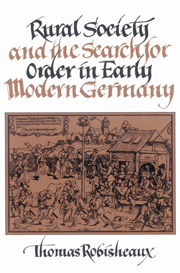Book contents
- Frontmatter
- Contents
- List of illustrations and tables
- Acknowledgments
- A note on usages
- Glossary
- List of abbreviations
- Introduction
- Part One Agrarian expansion, revolt, and the decay of community
- Part Two Search for order
- Part Three Crisis and recovery
- 8 Crisis
- 9 Agrarian order restored
- 10 Village society and the practice of state power
- Appendix A Distribution of wealth in Langenburg district, 1528–1581
- Appendix B Grain production and the peasant household
- Manuscript sources
- Bibliographical essay
- Index
- Frontmatter
- Contents
- List of illustrations and tables
- Acknowledgments
- A note on usages
- Glossary
- List of abbreviations
- Introduction
- Part One Agrarian expansion, revolt, and the decay of community
- Part Two Search for order
- Part Three Crisis and recovery
- 8 Crisis
- 9 Agrarian order restored
- 10 Village society and the practice of state power
- Appendix A Distribution of wealth in Langenburg district, 1528–1581
- Appendix B Grain production and the peasant household
- Manuscript sources
- Bibliographical essay
- Index
Summary
In the last four chapters we have examined the search for order in the sixteenth century. Now we turn to the crisis of the seventeenth century, when order gave way to confusion.
To understand the crisis in South Germany a number of characteristics of the agrarian order should be kept in mind. Never should one forget the tenuousness and the uncertainty of the social order, the fact that at every turn, when a measure of stability appeared at long last secure, deep and unresolved tensions still lay not far beneath the surface of events. In Hohenlohe the tensions flowed from the new terms of domination that weakened the state after 1610. The Assecuration became an embarrassing liability to the House of Hohenlohe, setting limits to state incomes and, from the point of view of Count Philip Ernst, creating a new sort of chaos in the territory:
As we have repeatedly seen, there has been a striking amount of chaos since the establishment of the Landsteuer. Many of the rich are not assessed even half of their worth, not of their fixed property or of their movables. And this has led to considerable trouble and to a decline of our laws. And the poor and those with little property, because of this state of affairs, can avoid their responsibilities only with much greater difficulty.
- Type
- Chapter
- Information
- Rural Society and the Search for Order in Early Modern Germany , pp. 201 - 226Publisher: Cambridge University PressPrint publication year: 1989



